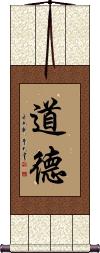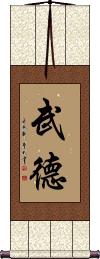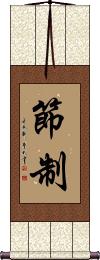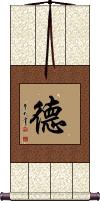Many custom options...
And formats...

Ethics in Chinese / Japanese...
Buy an Ethics calligraphy wall scroll here!
Personalize your custom “Ethics” project by clicking the button next to your favorite “Ethics” title below...
1. Ethics / Ethical / Morality
2. Martial Morality / Martial Arts Ethics / Virtue
3. The Five Tenets of Confucius
8. Isshin Dojo
Ethics / Ethical / Morality
道德 is a Chinese, Japanese, and old Korean word that can also be defined as “moral principles,” morality, ethics, ethical, morals, or virtue.
The first character is the same that is associated with Daoism / Taoism. This word is also used to express morality, virtue, or simply morals.
![]() There is a slight deviation in the Japanese Kanji form. If you want the modern Japanese version, please click on the special Kanji shown to the right instead of the button above. Note that the traditional Chinese form is still readable and understood by Japanese people.
There is a slight deviation in the Japanese Kanji form. If you want the modern Japanese version, please click on the special Kanji shown to the right instead of the button above. Note that the traditional Chinese form is still readable and understood by Japanese people.
Martial Morality / Martial Arts Ethics / Virtue
This refers to the virtue, morality, and ethics that any practitioner of martial arts should possess.
This can be used in both Chinese and Japanese in place of English terms such as “soldierly virtue,” “good conduct” (military), “warrior ethics,” and being honorable regarding any fight or competition.
In Japanese, there is a slight variation in the last character, making it 武徳 instead of 武德 in Japan. And yes, just one little horizontal stroke is omitted. If you need the Japanese version, please choose a Japanese calligrapher, or drop me a note so that I make sure you get the characters you intend.
See Also: Morality of Mind | Morality of Deed
The Five Tenets of Confucius
The Five Cardinal Rules / Virtues of Confucius
仁義禮智信 are the core of Confucius's philosophy.
Simply stated:
仁 = Benevolence / Charity
義 = Justice / Rectitude
禮 = Courtesy / Politeness / Tact
智 = Wisdom / Knowledge
信 = Fidelity / Trust / Sincerity
Many of these concepts can be found in various religious teachings. It should be clearly understood that Confucianism is not a religion but should instead be considered a moral code for a proper and civilized society.
This title is also labeled “5 Confucian virtues.”
![]() If you order this from the Japanese calligrapher, expect the middle Kanji to be written in a more simple form (as seen to the right). This can also be romanized as "jin gi rei satoshi shin" in Japanese. Not all Japanese will recognize this as Confucian tenets but they will know all the meanings of the characters.
If you order this from the Japanese calligrapher, expect the middle Kanji to be written in a more simple form (as seen to the right). This can also be romanized as "jin gi rei satoshi shin" in Japanese. Not all Japanese will recognize this as Confucian tenets but they will know all the meanings of the characters.
See Also: Confucius Teachings
Moderation / Temperance
節制 means moderation or temperance in Chinese, Japanese Kanji, and old Korean Hanja.
Moderation is creating a healthy balance in your life between work and play, rest and exercise. You don't overdo or get swept away by the things you like. You use your self-discipline to take charge of your life and your time.
節制 can also be translated as sobriety or self-restraint.
This is often used as part of the Seven Heavenly Virtues to represent sobriety and/or temperance.
Moral and Virtuous
德 is the simple way to express the ideas of having virtue, morals, kindness, benevolence, goodness, etc.
德 also happens to be the first character of the Chinese word for Germany.
![]() There is a slight deviation in the Japanese Kanji form. If you want the modern Japanese version, please click on the special Kanji shown to the right instead of the button above. Note that the traditional Chinese form is still readable and understood by Japanese people.
There is a slight deviation in the Japanese Kanji form. If you want the modern Japanese version, please click on the special Kanji shown to the right instead of the button above. Note that the traditional Chinese form is still readable and understood by Japanese people.
See Also: Chastity | Prudence | Benevolence | Morality
Hou De Zai Wu
Isshin Academy
一心学院 can be translated as “Isshin Academy.”
In martial arts usage, this term is typically chosen to express a training mindset, ethical conduct, or personal cultivation. It is commonly used in dojo culture, mottos, and calligraphy titles.
Cross-language note: while the core meaning is broadly shared across Chinese and Japanese usage, nuance and frequency can differ by tradition.
Isshin Dojo
一心道場 can be translated as “Isshin Dojo.”
In martial arts usage, this term is typically chosen to express a training mindset, ethical conduct, or personal cultivation. It is commonly used in dojo culture, mottos, and calligraphy titles.
Self-Discipline Martial Arts
克己武道 can be translated as “Self-Discipline Martial Way,” or “Self-Discipline Martial Arts.”
克己 = Self-mastery, or overcome the self.
武道 = Martial way, suggesting an ethical/lifelong path of training.
Martial way; ethical/lifelong path of training.
Goju Martial Arts
剛柔武道 can be translated as “Goju Martial Arts,” or “Goju Martial Way.”
剛柔 = Hard and soft or balanced power and yielding.
武道 = Martial way, martial arts, or an ethical/lifelong path of training.
The following table may be helpful for those studying Chinese or Japanese...
| Title | Characters | Romaji (Romanized Japanese) | Various forms of Romanized Chinese | |
| Ethics Ethical Morality | 道德 道德 / 道徳 | dou toku / doutoku / do toku | dào dé / dao4 de2 / dao de / daode | tao te / taote |
| Martial Morality Martial Arts Ethics Virtue | 武德 | bu toku / butoku | wǔ dé / wu3 de2 / wu de / wude | wu te / wute |
| The Five Tenets of Confucius | 仁義禮智信 仁义礼智信 | jin gi rei tomo nobu jingireitomonobu | rén yì lǐ zhì xìn ren2 yi4 li3 zhi4 xin4 ren yi li zhi xin renyilizhixin | jen i li chih hsin jenilichihhsin |
| Moderation Temperance | 節制 节制 | sessei / sesei | jié zhì / jie2 zhi4 / jie zhi / jiezhi | chieh chih / chiehchih |
| Moral and Virtuous | 德 徳 | toku | dé / de2 / de | te |
| Hou De Zai Wu | 厚德載物 厚德载物 | hòu dé zài wù hou4 de2 zai4 wu4 hou de zai wu houdezaiwu | hou te tsai wu houtetsaiwu |
|
| Isshin Academy | 一心學院 一心学院 | isshin-gakuin ishin-gakuin | yī xīn xué yuàn yi1 xin1 xue2 yuan4 yi xin xue yuan yixinxueyuan | i hsin hsüeh yüan ihsinhsüehyüan |
| Isshin Dojo | 一心道場 | isshin-dōjō ishin-dōjō | yī xīn dào chǎng yi1 xin1 dao4 chang3 yi xin dao chang yixindaochang | i hsin tao ch`ang ihsintaochang i hsin tao chang |
| Self-Discipline Martial Arts | 克己武道 | kokki bu dō kokkibudō koki bu dō | kè jǐ wǔ dào ke4 ji3 wu3 dao4 ke ji wu dao kejiwudao | k`o chi wu tao kochiwutao ko chi wu tao |
| Goju Martial Arts | 剛柔武道 | gō jū bu dō gōjūbudō | gāng róu wǔ dào gang1 rou2 wu3 dao4 gang rou wu dao gangrouwudao | kang jou wu tao kangjouwutao |
| In some entries above you will see that characters have different versions above and below a line. In these cases, the characters above the line are Traditional Chinese, while the ones below are Simplified Chinese. | ||||
Successful Chinese Character and Japanese Kanji calligraphy searches within the last few hours...













